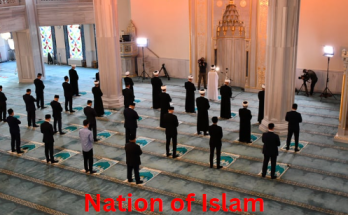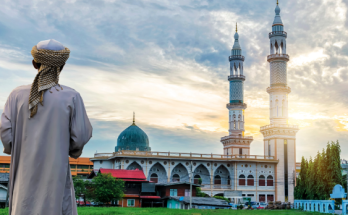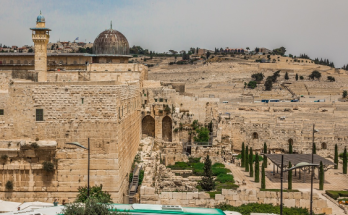Islam is a global religion with roots in the Arabian Peninsula and founded in the seventh century AD. Muslims consider it a religion of monotheism, submission to the will of God, and achieving goodness and justice in life.
History of Islam
The journey of Islam began when Prophet Muhammad (may God bless him and grant him peace) received a message from God through King Gabriel in the 7th century. This message is known as the Holy Qur’an and is the main text of Islam. The Prophet Muhammad began spreading this message and calling people to worship the one true God.
After the death of the Prophet Muhammad (may God bless him and grant him peace), Islam expanded rapidly and spread to different regions of the world. During this period, Islam established a model Islamic state in Medina, and Islamic law developed as a set of laws and ethics that sought to guide the daily lives of Muslims.
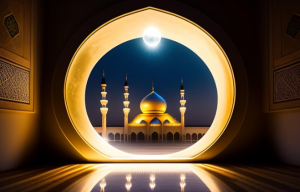
Principles of Islam
Islam is based on a set of basic principles that include:
– Monotheism: belief in the oneness of God, one who has no partners.
– Prayer: Performing the five daily prayers for direct communication with God.
– Fasting: Fasting during the month of Ramadan, during which Muslims abstain from eating and drinking from dawn until sunset.
– Zakat: It is the duty of Muslims to help the poor and needy by donating a portion of their wealth.
– Hajj: Travel to Mecca to perform the Hajj rituals once in a lifetime if they have the ability.
God in Islam
In Islam, God is the one true creator of the universe. He is personified with beautiful names and adjectives that illustrate greatness, mercy and justice. The Holy Qur’an is considered the pure word of God that was revealed to guide humanity.
These are some basic points about what Islam is.
Who are the Muslims?
Muslims are followers of Islam, one of the largest world religions. Muslims live all over the world and constitute a large and diverse community. To answer this question in detail, let us learn about who Muslims are and what distinguishes them.
Islam and Muslim identity
Islam is the religion of the monotheism of God and following the teachings of the Holy Quran and the Sunnah of the Prophet Muhammad (may God bless him and grant him peace). Muslims embrace this religion and live according to its principles and provisions. Muslim identity is characterized by a set of factors and beliefs that include the following:
Belief in God and His Messengers: Muslims believe in the oneness of God, who is unlike anything else, and in His messengers who were chosen to convey His message to humanity. The last of these messengers is the Prophet Muhammad (may God bless him and grant him peace).
Pillars of Islam: Muslims perform the five pillars of Islam, which are martyrdom (ratifying the oneness of God and the message of Muhammad), performing the five-year-old prayer, fasting during the month of Ramadan, giving zakat (alms), and performing the Hajj if they are able.
The Holy Qur’an: Muslims view the Holy Qur’an as a holy book containing the words of God, and they live according to its teachings and instructions.
Honesty and Justice: Muslims believe in the importance of honesty and justice in their daily lives. Islam encourages giving and helping the poor and needy.
Tolerance and unity: Islam encourages tolerance and unity between different cultures and races. Encourages living in peace and understanding with others.
Muslims in the world
Muslims constitute one of the largest religious minorities in the world, as they live in most countries of the world. There is great diversity among Muslims, and Muslims can be found from different cultural and social backgrounds.
In conclusion, Muslims are followers of Islam, a religion that calls for monotheism, worship, and charity. This religion promotes justice, tolerance and unity, and forms an important part of the world’s cultural and religious diversity.
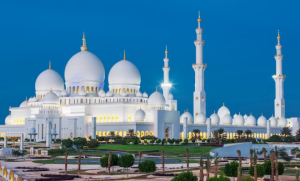
What does God mean?
The word “God” is considered one of the greatest and most profound words in the Arabic language, and it is fundamental to Islam and to Semitic religions in general. They carry deep and complex meanings that reflect faith, devotion, and divine understanding. Let’s delve into the meanings of this word.
First of all, “God” means the one and true God, besides whom there is no God. It shows His absolute oneness and perfection. “God” is the Creator who created the entire universe and directs its affairs and conditions.
In addition, “God” means mercy and love. He is a God who is merciful and kind, and graciously bestows His blessings on His creation. His mercy and care are expressed in beautiful names such as “Al-Rahman” and “Al-Rahim,” and believers find in Him a shelter for their affairs and prayers.
Also, “God” means creation and morality. Everything in this universe is God’s creation. He is the one who revived and created creatures, planets and galaxies. This word shows God’s power to create life and shape the universe.
Finally, “God” means servitude and submission. Believing in God and Islam means surrendering to His will and living according to His teachings. It always reminds Muslims of the necessity of submitting to the will of God and following His path.
In conclusion, “God” is a word that represents the greatest meanings and concepts in Islam and other religions. It embodies divinity, perfection and compassion, and expresses the special relationship between man and his Creator.
Who is Mohammed?
Muhammad (may God bless him and grant him peace) is a figure of great importance in Islamic history and to Muslims around the world. He is the last prophet, the seal of the prophets and messengers, and one of the greatest spiritual leaders in history. Let’s delve into who Muhammad is and what he represents to Muslims.
The origins of Muhammad (may God bless him and grant him peace)
Muhammad was born in Mecca in 570 AD. Born into a noble Quraysh family, he was known by the nickname “Al-Amin” because of his honesty and honesty. In the Year of the Elephant, in the year 570 AD, Muhammad was born, and this great event is known in Islamic history as the Year of the Elephant.
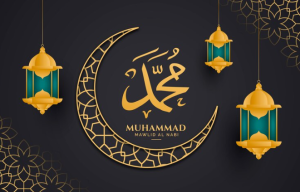
The prophetic message
In the year of Khosra, when Muhammad was forty years old, he received his prophetic mission. According to Islamic tradition, he was granted the vision of God through King Gabriel, who was entrusted with sending the message of Islam to humanity.
Message and invitation
Muhammad began to convey the message of Islam to those closest to him, and then to the common people. He called on people to worship the one true God and stay away from idols and polytheism. Transmitting religious and moral teachings through the Holy Qur’an, which is considered the main text of Islam.
Migration to the city
After intense opposition in Mecca, Muhammad and his followers decided to migrate to Medina in 622 AD. This event is known as the Prophet’s Migration, and is a major turning point in the history of Islam. In Medina, Muhammad succeeded in building a model Islamic state.
Successes and final message
During his life, Muhammad succeeded in spreading his message and bringing many people to faith in God. He delivered sermons and issued orders and legislation to regulate society and religious life. In 632 AD, Muhammad died in Medina, at the age of sixty.
Impact and influence
Muhammad is not considered just a historical figure, but rather a religious and spiritual role model for Muslims. Muslims consider him a missionary messenger, a guide, and a good role model in their lives. History bears witness to its great influence on the development of Islam and guiding people towards goodness and justice.
Conclusion: The message of Islam and its importance
At the conclusion of this article, we can conclude that Islam is a comprehensive religion and a divine message that aims to guide man in his life and direct him towards goodness and justice. Islam teaches Muslims to be moderate, compassionate, and tolerant, and urges them to fight oppression and injustice. It seeks to balance worship and daily life, and encourages the building of communities based on justice and cooperation.
Islam is distinguished by its teachings that express the concept of mercy, care and unity, and encourages goodness and assistance to the poor and needy. Emphasizes the importance of education, learning and the pursuit of knowledge. It promotes moral values and ethics in dealing with others and encourages honesty and justice.
Islam is a religion that encourages thinking and independence, understanding the world and sharing it positively. It teaches Muslims the importance of achieving balance in life, working toward peace, and positive connection with the world around them.
In conclusion, Islam is a comprehensive religion that calls for belief in God, following His teachings, and promoting justice and tolerance in society. Islam forms an important part of human civilization and contributes to building a better world.
ما هو الإسلام؟
الإسلام هو ديانة عالمية تمتد جذورها إلى شبه الجزيرة العربية والتي تأسست في القرن السابع الميلادي. يعتبرها المسلمون ديانة توحيد وخضوع لإرادة الله وتحقيق الخير والعدالة في الحياة.
تاريخ الإسلام
بدأت رحلة الإسلام عندما تلقى النبي محمد (صلى الله عليه وسلم) رسالة من الله من خلال الملك جبريل في القرن السابع. هذه الرسالة تعرف بالقرآن الكريم وهي النص الرئيسي للإسلام. بدأ النبي محمد بنشر هذه الرسالة ودعوة الناس إلى عبادة الله الواحد الحقيقي.
بعد وفاة النبي محمد (صلى الله عليه وسلم)، توسعت الإسلام بسرعة وانتشرت إلى مناطق مختلفة من العالم. خلال هذه الفترة، أسس الإسلام دولة إسلامية نموذجية في المدينة المنورة، وتطورت الشريعة الإسلامية كمجموعة من القوانين والأخلاقيات التي تسعى لتوجيه الحياة اليومية للمسلمين.
مبادئ الإسلام
الإسلام يقوم على مجموعة من المبادئ الأساسية التي تشمل:
– التوحيد: الإيمان بوحدانية الله الواحد الذي لا شريك له.
– الصلاة: أداء الصلوات الخمس يوميًا للاتصال المباشر مع الله.
– الصوم: صيام شهر رمضان، حيث يمتنع المسلمون عن تناول الطعام والشراب من الفجر حتى الغروب.
– الزكاة: الواجب على المسلمين مساعدة الفقراء والمحتاجين من خلال التبرع بجزء من ثروتهم.
– الحج: السفر إلى مكة لأداء مناسك الحج مرة واحدة في العمر إذا كانت لديهم القدرة.
الله في الإسلام
في الإسلام، الله هو الواحد الحقيقي والخالق للكون. يتم تجسيده بأسماء وصفات جميلة توضح العظمة والرحمة والعدالة. يُعتبر القرآن الكريم كلام الله النقي الذي أُنزل لهداية البشر.
هذه هي بعض النقاط الأساسية حول ما هو الإسلام.
من هم المسلمون؟
المسلمون هم متبعو الإسلام، وهي إحدى أكبر الديانات العالمية. المسلمون يعيشون في جميع أنحاء العالم ويشكلون مجتمعًا كبيرًا ومتنوعًا. للإجابة على هذا السؤال بتفصيل، دعونا نتعرف على من هم المسلمون وما يميزهم.
الإسلام والهوية المسلمة
الإسلام هو دين توحيد الله واتباع تعاليم القرآن الكريم وسنة النبي محمد (صلى الله عليه وسلم). المسلمون يعتنقون هذا الدين ويعيشون وفقًا لمبادئه وأحكامه. تميز الهوية المسلمة بمجموعة من العوامل والمعتقدات التي تشمل ما يلي:
الإيمان بالله ورسله: المسلمون يؤمنون بوحدانية الله الذي لا يشبهه شيء، وبرسله الذين تم اختيارهم لنقل رسالته إلى البشرية. آخر هؤلاء الرسل هو النبي محمد (صلى الله عليه وسلم).
أركان الإسلام: المسلمون يؤدون أركان الإسلام الخمسة وهي الشهادة (التصديق على وحدانية الله ورسالة محمد) وأداء الصلاة الخمسية وصوم شهر رمضان وإيجاد الزكاة (الصدقات) وأداء فريضة الحج إذا أستطاعوا.
القرآن الكريم: المسلمون يرون القرآن الكريم ككتاب مقدس يحتوي على كلام الله، وهم يعيشون وفقًا لتعاليمه وإرشاداته.
الصدق والعدالة: المسلمون يؤمنون بأهمية الصدق والعدالة في حياتهم اليومية. يشجع الإسلام على العطاء ومساعدة الفقراء والمحتاجين.
التسامح والوحدة: الإسلام يشجع على التسامح والوحدة بين مختلف الثقافات والأعراق. يُشجع على العيش بسلام وتفهم مع الآخرين.
المسلمون في العالم
المسلمون يشكلون أحد أكبر الأقليات الدينية في العالم، حيث يعيشون في معظم دول العالم. هناك تنوع كبير بين المسلمين، ويمكن العثور على مسلمين من مختلف الخلفيات الثقافية والاجتماعية.
في الختام، المسلمون هم أتباع الإسلام، ديانة تدعو إلى التوحيد والعبادة والإحسان. تشجع هذه الديانة على العدالة والتسامح والوحدة، وتشكل جزءًا هامًا من التنوع الثقافي والديني في العالم.
ماذا يعني الله؟
كلمة “الله” تُعَدُّ واحدة من أعظم وأعمق الكلمات في اللغة العربية، وهي أساسية في الإسلام وفي الديانات السامية بشكل عام. إنها تحمل معانٍ عميقة ومعقدة تعكس الإيمان والعبودية والفهم الإلهي. دعونا نتعمق في معاني هذه الكلمة.
أولًا وقبل كل شيء، “الله” تعني الإله الواحد والحقيقي، الذي لا يوجد إله سواه. إنها تُظهر وحدانيته المطلقة والكمال الذي يمتاز به. إن “الله” هو الخالق الذي خلق الكون بأسره ويسير أموره وأحواله.
بالإضافة إلى ذلك، “الله” تعني الرحمة والمحبة. إنه الإله الذي يتسم بالرحمة والعطف، ويتفضل بنعمه على خلقه. يُعبِّر عن رحمته وعنايته بأسماء جميلة مثل “الرحمن” و “الرحيم”، والمؤمنون يجدون فيه مأوى لأمورهم ودعواتهم.
كذلك، “الله” تعني الخلق والخلقية. إن كل ما في هذا الكون هو خلق “الله”. إنه الذي أحيا وأبدع الكائنات والكواكب والمجرات. تُظهر هذه الكلمة قوة الله في إبداع الحياة وتشكيل الكون.
أخيرًا، “الله” تعني العبودية والخضوع. إن الإيمان بالله والإسلام يعني الاستسلام لإرادته والعيش وفقًا لتعاليمه. إنها تذكر المسلمين دائمًا بضرورة الخضوع لإرادة الله واتباع سبيله.
في الختام، “الله” هو كلمة تمثل أعظم المعاني والمفاهيم في الإسلام والديانات الأخرى. إنها تجسد الإلهية والكمال والرحمة، وتعبر عن العلاقة الخاصة بين الإنسان وخالقه.
من هو محمد؟
محمد (صلى الله عليه وسلم) هو شخصية ذات أهمية عظيمة في التاريخ الإسلامي وللمسلمين في جميع أنحاء العالم. إنه النبي الأخير وخاتم الأنبياء والرسل وأحد أعظم القادة الروحيين في التاريخ. دعونا نتعمق في معرفة من هو محمد وماذا يمثل بالنسبة للمسلمين.
نشأة محمد (صلى الله عليه وسلم)
محمد وُلد في مكة المكرمة في عام 570 ميلادي. ولد في عائلة قريشية نبيلة، وكان معروفًا بلقب “الأمين” بسبب أمانته وصدقه. في سنة الفيل، عام 570 ميلادي، ولد محمد، وهذا الحدث العظيم يُعرف في التاريخ الإسلامي بأنه العام الفيل.
الرسالة النبوية
في سنة الكسرى، عندما كان محمد في سن الأربعين، تلقى رسالته النبوية. وفقًا للتقاليد الإسلامية، تم منحه رؤية الله عبر الملك جبريل، الذي أوكل له ببعث رسالة الإسلام إلى البشرية.
الرسالة والدعوة
بدأ محمد بنقل رسالة الإسلام إلى أقرب الناس، ومن ثم إلى العامة. دعا الناس لعبادة الله الواحد الحقيقي والابتعاد عن الأصنام والشرك. نقل تعاليم دينية وأخلاقية من خلال القرآن الكريم، الذي يعتبر النص الرئيسي للإسلام.
الهجرة إلى المدينة
بعد معارضة شديدة في مكة، قرر محمد وأتباعه الهجرة إلى المدينة المنورة في عام 622 ميلادي. وهذا الحدث يعرف باسم الهجرة النبوية، وهو نقطة تحول رئيسية في تاريخ الإسلام. في المدينة، نجح محمد في بناء دولة إسلامية نموذجية.
النجاحات والرسالة الختامية
خلال حياته، نجح محمد في نشر رسالته وجلب العديد من الناس إلى الإيمان بالله. ألقى خطب وأصدر أوامر وتشريعات لتنظيم المجتمع والحياة الدينية. وفي عام 632 ميلادي، توفي محمد في المدينة المنورة، وهو في سن الستين.
الأثر والتأثير
محمد لا يعتبر مجرد شخصية تاريخية بل هو قدوة دينية وروحية للمسلمين. يعتبره المسلمون رسولًا مُبشِّرًا ومُهتدِيًا وأسوة حسنة في حياتهم. يشهد التاريخ على تأثيره الكبير على تطوير الإسلام وتوجيه الناس نحو الخير والعدالة.
الختام: رسالة الإسلام وأهميتها
في ختام هذا المقال، يمكن أن نستنتج أن الإسلام هو دين شامل ورسالة إلهية تهدف إلى توجيه الإنسان في حياته وتوجيهه نحو الخير والعدالة. يُعلِّم الإسلام المسلمين بأن يكونوا معتدلين ورحماء وتسامحين، ويحثهم على محاربة الظلم والظلمان. إنه يسعى لتحقيق التوازن بين العبادة والحياة اليومية، ويشجع على بناء مجتمعات قائمة على العدالة والتعاون.
الإسلام يمتاز بتعاليمه التي تعبر عن مفهوم الرحمة والرعاية والوحدة، ويشجع على الخير والمساعدة للفقراء والمحتاجين. يؤكد على أهمية التعليم والتعلم والبحث عن المعرفة. إنه يعزز القيم الأخلاقية والأخلاق في التعامل مع الآخرين ويحث على الصدق والعدالة.
الإسلام هو دين يشجع على التفكير والاستقلالية، وفهم العالم ومشاركته بشكل إيجابي. يعلم المسلمين بأهمية تحقيق التوازن في الحياة والعمل نحو تحقيق السلام والتواصل الإيجابي مع العالم من حولهم.
بالختام، الإسلام هو دين شامل يدعو إلى الإيمان بالله ومتابعة تعاليمه وتعزيز العدالة والتسامح في المجتمع. يُشكل الإسلام جزءًا مهمًا من حضارة الإنسانية ويسهم في بناء عالم أفضل
